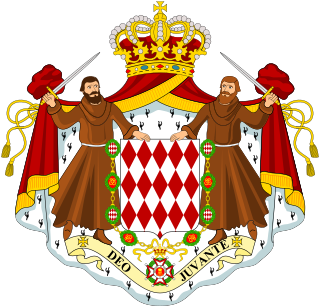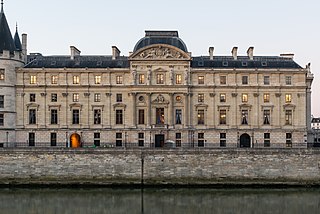Related Research Articles

The politics of Monaco take place within the framework of a constitutional monarchy, with the Prince of Monaco as head of state, with some powers devolved to several advisory and legislative bodies.

The Court of Cassation is one of the four courts of last resort in France. It has jurisdiction over all civil and criminal matters triable in the judicial system, and is the supreme court of appeal in these cases. It has jurisdiction to review the law, and to certify questions of law, to determine miscarriages of justice. The Court is located in the Palace of Justice in Paris.

The Palais de Justice, is a judicial center and courthouse in Paris, located on the Île de la Cité. It contains the Court of Appeal of Paris, the busiest appellate court in France, and France's highest court for ordinary cases, the Court of Cassation. It formerly housed the Tribunal de grande instance de Paris which was relocated in 2018 to a new high-rise building in Paris's Batignolles neighborhood. The Palais de Justice occupies a large part of the medieval Palais de la Cité, the former royal palace of the Kings of France, which also includes Sainte Chapelle, the royal chapel, and the Conciergerie, a notorious former prison, which operated from 1380 to 1914. It is located in close proximity to the Tribunal of Commerce, the Prefecture of Police of Paris, and the offices of the Paris Bar Association.

In France, career judges are considered civil servants exercising one of the sovereign powers of the state, so French citizens are eligible for judgeship, but not citizens of the other EU countries. France's independent court system enjoys special statutory protection from the executive branch. Procedures for the appointment, promotion, and removal of judges vary depending on whether it is for the ordinary or administrative stream. Judicial appointments in the judicial stream must be approved by a special panel, the High Council of the Judiciary. Once appointed, career judges serve for life and cannot be removed without specific disciplinary proceedings conducted before the Council with due process.

The Court of Cassation of Belgium is the supreme court of the Belgian judiciary. The Court is composed of thirty judges with life tenure who are nominated by the High Council of Justice of Belgium and appointed by the Belgian federal government. The Court handles cases in the two main languages of Belgium, being Dutch and French, and provides certain facilities for cases in German. The Court is assisted in its work by a public prosecutor's office and a bar association, which both function separately from other structures. The duty of the public prosecutor's office is to provide advisory opinions to the Court on how the law ought to be interpreted and applied. The attorneys of the Court's bar association assist litigants in proceedings before the Court; in certain cases their assistance is mandatory.

The courts of appeal are the main appellate courts in the judicial system of Belgium, which hear appeals against judgements of the tribunals of first instance, the enterprise tribunals and the presidents of those tribunals in their judicial area. There are five courts of appeal for each of the five judicial areas, which are the largest geographical subdivisions of Belgium for judicial purposes. The division of the Belgian territory into the five judicial areas is laid down in article 156 of the Belgian Constitution. A judicial area covers multiple judicial arrondissements ("districts"), except for the judicial area of Mons. Each arrondissement has a tribunal of first instance. Further below, an overview is provided of the five courts of appeal and the judicial arrondissements their judicial area covers. It is important to note that the courts of appeal do not hear appeals against judgements of the labour tribunals; these are heard by the courts of labour.

The Supreme Court is the highest civil and criminal court in Burundi. It has nine members, including the Court President, who are nominated by the Judicial Service Commission and appointed by the President of the Republic after the approval of the Senate. The court's president is referred to as the Chief Justice.

The Monegasque Supreme Court is one of the highest courts of law in the city-state of Monaco for judicial appeals as well as ensuring the constitution of Monaco is upheld. It consists of five chief members and two assistant judges, appointed by the Prince of Monaco at the recommendation of the National Council of Monaco and other government bodies. The Supreme Court was established in 1962 following the new constitution to guarantee fundamental liberties.

The French National School for the Judiciary is a French grande école, founded in 1958 by French President Charles de Gaulle and the « father » of the current French Constitution, Michel Debré, in order to encourage law students to embrace a judicial career. Originally referred to as the National Centre for Judicial Studies, it was renamed the French National School for the Judiciary in 1972.

The Supreme Court of Haiti is the highest court in the Haitian legal system. The Supreme Court building is located in Port-au-Prince.
The judiciary of Luxembourg comprises a number of courts.

The Tribunal judiciaire de Paris, located at the Judicial Campus of Paris in Batignolles, is the largest court in France by caseload. It replaced the capital's former Tribunal de grande instance and Tribunal d'instance under an amalgamation of jurisdictions that came into effect on January 1, 2020.

In French law, the ministère public or le parquet is the authority charged with defending the interests of society and of the application of law. It is primarily made up of magistrates, but is sometimes represented by other persons such as police officials. Its magistrates can be referred to as "standing" magistrates, as opposed to magistrats du siège. Its closest equivalent in some English-speaking countries is the director of public prosecutions and the attorney general in others.

In France, a cour d’appel of the ordre judiciaire (judiciary) is a juridiction de droit commun du second degré, a. It examines judgements, for example from the correctional tribunal or a tribunal de grande instance. When one of the parties is not satisfied with the verdict, it can appeal. While communications from jurisdictions of first instance are termed "judgements", or judgments, a court of appeal renders an arrêt (verdict), which may either uphold or annul the initial judgment. A verdict of the court of appeal may be further appealed en cassation. If the appeal is admissible at the cour de cassation, that court does not re-judge the facts of the matter a third time, but may investigate and verify whether the rules of law were properly applied by the lower courts.

In France, the tribunal correctionnel is the court of first instance that governs in penal matters over offenses classified as misdemeanors and committed by an adult. In 2013, French correctional tribunals rendered 576,859 judgments on action publique, pronounced 501,171 verdicts and homologué 67,983 compositions pénales.

The Ministry of Justice is a ministerial department of the Government of France, also known in French as la Chancellerie. It is headed by the Minister of Justice, also known as the Keeper of the Seals, a member of the Council of Ministers. The ministry's headquarters are on Place Vendôme, Paris.
Hubert Charles (1925-2017) was a French-Monegasque judge and lawyer, Honorary Professor of Law at the University of Nice Sophia-Antipolis, President of Supreme Court of Monaco from 2007 to 2012, Honorary President of the Supreme Court of Monaco. Charles was particularly known for his work in administrative law and town planning law.
The Court of Appeal is a court of the second level of the judiciary in civil, criminal, commercial and administrative matters in the Principality of Monaco. The Court of Appeal judges on appeals of judgments delivered by the Court of First Instance. The Court of Appeal has a remarkable position in the Monegasque justice system due to its regulatory function, which is both judicial and legal. On the legal side, many of the Court’s judgments constitute law references establishing the Monegasque State of Law. On the judicial side, the Court contributes to guaranteeing that the institution of justice will comply both with law and professional ethics.
The High Council of Judges and Prosecutors is a collegial body invested with a preponderant role within the framework of the administration of justice of the Principality of Monaco. The High Council of Judges and Prosecutors was instituted by the law n° 1364 of November 16, 2009 relating to the statute of the magistracy. In November 2018, the new members of the High Judicial Council have been introduced in their new functions, under the chairmanship of Laurent Anselmi, Director of Judicial Services.
René Sylvestre was a Haitian jurist and lawyer. He had served as Chief Justice of the Supreme Court of Haiti from February 2019 until his death.
References
- ↑ "The Court of Revision". www.en.gouv.mc. Archived from the original on 2014-03-20. Retrieved 22 May 2021.
- ↑ "LégiMonaco - Textes non codifiés - Loi n. 783 du 15/07/1965 portant organisation judiciaire". www.legimonaco.mc. Retrieved 2021-05-22.
- ↑ "Monaco Cour de révision". AJHUCAF | Cours suprêmes judiciaires francophones (in French). Retrieved 2021-05-22.
- ↑ "DIRECTION DES SERVICES JUDICIAIRES". cloud.gouv.mc (in French). Archived from the original on 2012-02-25. Retrieved 2021-05-22.
